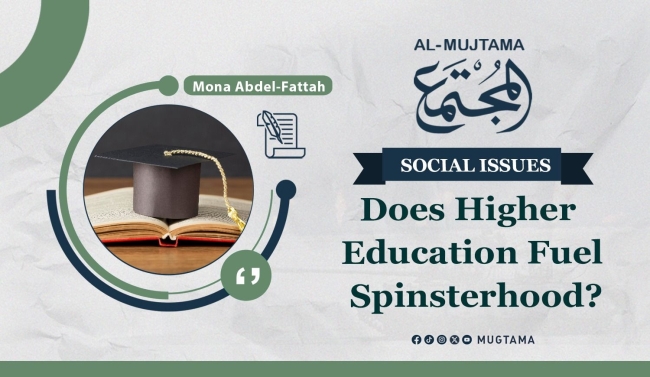She told me: "I have earned my master's degree, and I am on my way to traveling to Europe to pursue a PhD," then she wondered: "What comes next?!"
She continued: "Yes, I have proved myself and reached a prestigious academic position, but I wake up in the morning with no one to look at, nor anyone to look at me. If I fall ill, there is no one to stand by my side or care for me."
Thus, she spoke after the years had passed, and she approached the age of fifty, having accomplished her goals and attained high academic and social status. Yet, she woke up to a bitter truth and a difficult question: Where is my motherhood? Where is love? Where is the husband? Where is the child?
This is the case for many women and some men, who have pursued self-fulfillment with a spirit of defiance—against human nature, social necessity, and prophetic tradition. Among women in particular, this pursuit is sometimes mixed with a spirit of rivalry against men and a stubborn rejection of a woman's needs as a female seeking chastity, love, marriage, and offspring.
I am not among those who portray education as an obstacle to marriage, nor do I oppose women attaining prestigious academic positions or traveling abroad to fulfill their dreams and ambitions in accordance with Islamic guidelines. However, I do oppose those who bury their femininity under the dust, turn a blind eye to their natural disposition, and neglect their need for a righteous man who can be a source of comfort, love, and mercy.
During the time of the Prophet ﷺ, women were scholars, narrators of hadith, poets, physicians, and warriors. Yet, none of this prevented them from marrying and having children. They were like fruitful trees, giving birth to the finest of the companions who protected Islam and carried the banner of jihad.
Modern media, under Western-influenced feminist agendas, has distorted the image of marriage and even made women resent it. It portrays marriage as an obstacle to education, a barrier to dreams, and a weapon that destroys a woman's ambitions.
To make matters worse, media outlets, through films and TV dramas, have worked their magic by depicting men as enemies of women—oppressors who crush their dreams, obstacles to their freedom, and jealous individuals who cannot tolerate seeing women achieve high academic degrees and prestigious positions.
It must be said with frankness: The completion of academic pursuits between the ages of 35 and 40 significantly reduces a woman's chances of marriage, especially in a society that labels women at this age as "spinsters." Society perceives their chances of bearing children as declining and their youthful bloom as having faded.
The dilemma is further exacerbated, according to specialized studies, by the need for women to reorder their priorities—first focusing on education, then entering the job market, and finally considering marriage, provided they find a partner who aligns with their choices and aspirations.
A crucial and sensitive factor to consider is how a woman's self-perception changes once she attains an advanced academic degree or a prestigious position. She may develop an attitude of superiority and view potential suitors as beneath her status, rejecting them by saying: "I want an academic like myself, or a renowned doctor, or a businessman."
Many recent studies indicate that the specter of spinsterhood looms over women who graduate from elite colleges or earn master's and doctoral degrees. Reports, including one by the Egyptian Land Center for Human Rights, reveal that the higher a woman's level of education, the lower her chances of marriage.
Certain professions have even become known as strongholds of spinsterhood, such as medicine, journalism, and media, particularly due to high salaries and the increasing degree of workplace interaction, which leads many men to hesitate in seeking marriage with women in these fields.
A study titled The Delay of University Youth Marriage in the United Arab Emirates: Influences and Solutions found that 36.70% of respondents believe that continuing education is a barrier to marriage.
A similar study, The Delay of Marriage Among Young Males—A Field Study on a Sample from the City of Al-Hos in Jordan, reported that 35% of respondents considered a woman's high level of education a cause for delayed marriage.
There is an urgent need to increase societal awareness of the dimensions and implications of this issue and ways to address it—without compromising women's education—while understanding that a well-educated woman will positively impact the upbringing of future generations. This should be accompanied by strengthening home-learning programs that enable women to balance marriage and higher education.
It is also crucial to correct the negative narratives imposed by the media by highlighting successful female role models who have balanced marriage and education, as well as showcasing real-life examples of men who support their wives in attaining higher degrees.
Both men and women must work together to combat the issue of delayed marriage to avoid its social repercussions—such as the rise in harassment, immorality, homosexuality, and extramarital relationships. At the same time, society must promote a balanced view of women, recognizing them as wives, mothers, and holders of the highest academic qualifications—only then will society truly prosper.
-------------------------------------------------------------
An Egyptian writer interested in educational affairs


